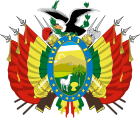This article needs additional citations for verification .(June 2013) |
 |
|---|
Constituent Assembly elections were held in Bolivia on 2 July 2006, alongside a referendum on increased regional autonomy. [1] The ruling Movement for Socialism won 137 of the 255 seats. [1]